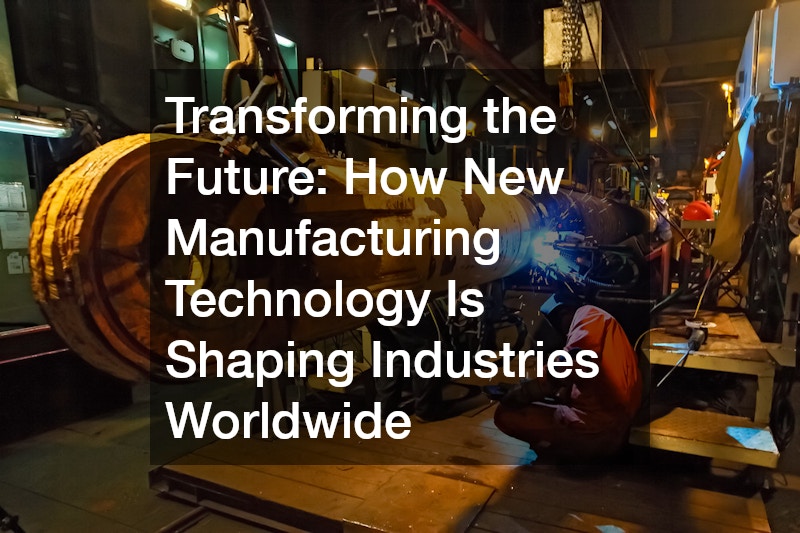The term “new manufacturing technology” refers to the most recent advancements and innovations that have revolutionized the way in which products are produced, designed, and delivered. These include cutting-edge technologies like 3D printing and robotics. Artificial intelligence, Internet of Things devices, and Internet of Things devices are also included.
Innovative manufacturing technologies have several key features, including increased automation, better precision, greater efficiency, and more flexibility. These technologies enable manufacturers to produce more complex, customized products faster while reducing waste and costs.
Innovative manufacturing technology allows companies to produce goods of high quality with greater speed and precision, resulting in increased competitiveness on the global market.
How Does New Manufacturing Differ From Traditional Methods?
New manufacturing technology is different from traditional methods, especially in terms of outcomes and processes. The traditional manufacturing process relies on manual labor, and long production cycles are common. New technology uses automation and digitalization in order to streamline operations.
The impact of efficiency and productivity is a major difference. The new manufacturing technology leads to faster production cycles, less downtime and improved quality control. This results in higher output levels and overall performance.
New technology allows manufacturers to adapt more quickly to changing consumer preferences, as well as respond to market changes.
Applications Across Industries

Innovative manufacturing technologies are being used in many industries, such as automotive, aerospace and electronics. These technologies are used to create a variety of products, ranging from consumer goods to high-tech components.
Manufacturing examples include the manufacture of custom golf cart seats using CNC machines. Also, the production of PET preforms for the packaging industry and custom laser cutting for industrial supplies in various applications are all examples. Businesses are also using new technology to optimize production processes, reduce lead time, and improve product quality.
The new manufacturing technology drives innovation in multiple industries. This allows businesses to stay on top of the competition, and meet the changing demands of the market.
Improving Sustainability With Technology
The new manufacturing technology plays a vital role in promoting sustainable production by reducing emissions and waste. Manufacturers can reduce material waste and energy consumption by implementing advanced technology such as robotics and CNC equipment.
In addition, the integration of renewable energy sources like solar power and wind energy into manufacturing facilities further enhances sustainability efforts. Businesses are implementing eco-friendly practices in order to reduce their carbon footprint and contribute to a cleaner, greener environment.
Businesses can create a sustainable future by embracing innovative manufacturing technologies.
Challenges of Implementation
The initial investment needed to adopt advanced equipment and systems is one of the biggest challenges in implementing innovative manufacturing technologies. The initial investment required to adopt these advanced systems and equipment can be significant.
A second challenge is to reskill and upskill the workforce in order to maintain and operate the new technology. It is essential that employees have the skills they need to use innovative manufacturing technologies and to drive innovation in the organization.
The benefits of adopting innovative manufacturing technologies far outweigh any costs. Companies that embrace innovation will reap the rewards in terms of increased efficiency, productivity, and competitiveness.
Enhancing Product Customization
A new manufacturing technology has revolutionized product customization, offering consumers an array of customized options and configurations. Companies can produce customized products efficiently using advanced CNC machines and automated manufacturing processes.
Manufacturers are using technology to provide unique and innovative solutions for their customers. From custom golf cart seating to bespoke industrial design models, they leverage the power of technology to offer a wide range of products. Innovative manufacturing technologies are flexible and scalable, allowing companies to quickly respond to market changes and produce customized products more accurately and efficiently.
Businesses can increase customer satisfaction and build brand loyalty by embracing new technologies that allow for product customization. They will also be able to differentiate themselves from their competitors in an increasingly competitive market.
The Role of AI in Manufacturing
Artificial intelligence (AI), which drives automation and optimization of production processes, plays a crucial role in innovative manufacturing technologies. AI algorithms can be used to analyze large data sets, predict maintenance requirements, optimize supply chains, and improve quality control at manufacturing facilities.
AI-driven automation allows manufacturers to improve their efficiency, streamline operations, and reduce human error. Machine learning and cognitive computing can help companies achieve greater levels of precision and productivity in their manufacturing processes.
AI is evolving, and its applications to manufacturing are getting more sophisticated. This will lead to smarter factories, and production systems more flexible, able to adapt to changing market dynamics, and customer needs.
How 3D Printing is Revolutionizing Production
The 3D printing revolutionizes manufacturing, offering an efficient and cost-effective alternative to traditional methods of production. Manufacturers can produce complex geometries and rapid prototypes with 3D printing. They also have reduced lead times and minimal waste.
3D printing has many advantages over other methods, including the ability to create intricate designs, lower production costs, and optimize logistics in supply chains. 3D printing is used by companies for many applications, including rapid prototyping and on-demand production of spare parts.
Future applications for 3D printing could include customized consumer products, medical implants, and even whole buildings. 3D printing opens up new possibilities for manufacturing and changes the way that products are designed.
Job Opportunities in the Tech-Driven Workforce

As innovative manufacturing technologies are adopted, the skills required in the industry will change. This will lead to more advanced technological roles. Automated systems and robots are taking on repetitive tasks. There is an increasing demand for employees who have digital literacy, problem-solving skills, and experience operating CNC equipment.
Automation may have displaced some manufacturing jobs, but new technologies are also creating new opportunities for employment in fields such as data analysis, cybersecurity, and robotics engineering. Businesses invest in workforce development programs that help them upskill and prepare their employees for the jobs of tomorrow.
The industrial sector can be transformed by innovative manufacturing technologies that create new opportunities for collaboration, innovation, and career development.
Global Supply Chain Optimization
The new manufacturing technology improves global supply chains through improved efficiency in logistical and distribution processes. Companies can optimize supply chains, reduce lead time, and minimize costs with real-time data analysis, IoT devices, and automated systems.
Public warehouses are adopting new technology to improve visibility and traceability throughout the supply chain. This ensures smooth inventory management and on-time deliveries. Cloud-based platforms and central data systems allow manufacturers to synchronize their production schedules with forecasts of demand and react quickly to changes in the market.
The new technology also enhances the resilience of supply chain in times of disruption. It allows businesses to reduce risks, adapt to changes in market conditions and maintain operational continuity even during unexpected events.
Successful Case Studies
A number of companies are leading in the adoption of technology and showing the transformative potential of new manufacturing technologies. A trailer manufacturer, for example, has implemented IoT and predictive maintenance algorithms in order to optimize production and reduce downtime.
Contract manufacturing companies use AI-driven automation to enhance their operational efficiency and improve quality. These companies can achieve greater levels of accuracy and productivity by integrating robotics and smart sensors into their operations.
The importance of investing into innovation, creating a culture of continual improvement, and encouraging collaboration between cross-functional team members are some of the lessons learned from successful manufacturing transformations.
Cybersecurity in Smart Manufacturing
To protect against cyber-threats and ensure the resilience of smart factory, it is essential to protect data and systems. To secure industrial systems and prevent unauthorized entry, manufacturers are using robust cybersecurity measures, such as network segmentation and encryption.
Cyber threats can be mitigated in smart factories by performing regular security audits and educating employees on best practices. Incident response plans are also implemented. Companies can protect their sensitive data and minimize the impact of cyberattacks by proactively addressing security risks.
It is important to ensure the integrity and security of manufacturing processes in order to maintain trust with customers, stakeholders, and suppliers. This will also help prevent production disruptions due cyber incidents.
Future Trends in Manufacturing Technology
IoT devices, blockchains, and virtual/augmented realities (VR/AR) are transforming the manufacturing industry and driving innovation. IoT devices enable connected factories to communicate in real-time, optimize production flow, and predict maintenance requirements.
Blockchain technology has revolutionized supply chain management. It provides a transparent and secure system to track and verify transactions throughout the manufacturing network. Blockchain technology allows companies to improve traceability, reduce fakes, and increase data integrity within their supply chain.
Virtual reality and VR technologies are changing the way that products are designed and prototyped. They also allow manufacturers to test their product concepts in virtual environments before they go into production. These trends are reshaping manufacturing and creating a more efficient, sustainable, and interconnected industry.
Global Competition and Collaboration
Smart manufacturing is becoming a major competitive advantage, and companies are leveraging this technology to gain an edge on the market. Manufacturers can improve their production efficiency by investing in AI and digitalization. They will also reduce costs and provide superior products to their customers.
Companies are adopting innovative manufacturing technologies to keep up with the times and to meet the needs of a globalized marketplace. Businesses can become leaders in their industry by embracing continuous improvement and innovation. This will lead to sustainable growth.
Manufacturing is undergoing rapid change. Technology plays a key role in shaping its future and determining success for companies in an environment of hyper-competitive markets.
Ethical Considerations in Technology Adoption
The manufacturing industry is undergoing a digital transformation. As a result, ethical issues such as employment, data privacy and technology use are increasingly important. Automation’s impact on employment dynamics is raising questions about its impact on workers, and the need for programs that will help them to transition.
Data security, privacy and transparency are also important concerns when it comes to the ethical use of technology and data in manufacturing. Manufacturers adopting new technologies must take into account ethical issues such as fair treatment of workers, intellectual property rights and sustainable practices.
Companies that adhere to ethical standards and values can create trust among stakeholders, a positive working environment and contribute to long-term sustainability in the manufacturing industry.
Manufacturing technology has transformed our world, driving innovation, improving efficiency, and shaping the industrial sector’s future. Companies across industries, from custom golf cart seats to trailer makers, are adopting advanced technology in order to remain competitive, reduce costs, and meet the needs of a rapidly evolving market.
New manufacturing technologies, such as enhanced sustainability, product customization and global supply chain, pave the way for an industry that is more efficient, interconnected and sustainable. Manufacturers can achieve sustainable growth by embracing new trends and adhering to ethical principles.
